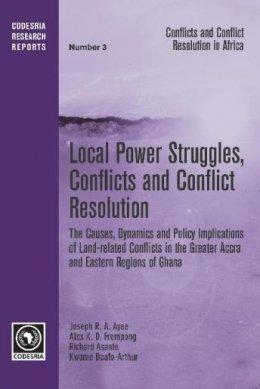Local power Struggles, Conflicts and Conflicts Resolution. The causes, Dynamics and Policy Implications of Land-related Conflicts in the Greater Accra and Eastern Regions of Ghana
Keywords:
Local power, Struggles, Conflicts, Resolution, causes, Dynamics, Policy , Greater Accra , Eastern Regions, GhanaSynopsis
Ghana appears an oasis of peace in a sub-region which over the last one and half decades has been better known for violent civil conflict than democracy and development. Behind this smokescreen of stability, however, there have been various forms of local conflicts some of which have turned violent. Indeed some of these violent local conflicts preceded independence and have waxed and waned with the politics of the time. But perhaps the intriguing thing is that none has assumed national dimension thus far. Land is an asset and a resource with economic, political, social and cultural ramifications. An important problem of land tenure systems is endemic conflict, which has involved chiefs, family heads, government, individuals and groups in various permutations. The endemic nature of most of these conflicts suggests they are embedded in local power structures and social group membership.
Land conflicts entail many political, economic and social costs, including the costs of policing conflicts, loss of life, livelihoods and property, displacement and social and economic insecurity.
Among several initiatives taken to address the conflicts and their underlying causes are an alternative dispute resolution system and the Land Administration Project of 2003, which to date is the most comprehensive programme. This initiative has not been able to solve the problem of land management and its associated conflicts. As a contribution to the continuing debate over land tenure and its associated conflicts in Ghana, this study analyses the causes of some of the conflicts in selected towns in the Greater Accra and the eastern regions. It examines the role of the actors, the dynamics of land tenure, the conflict resolution mechanisms especially the role played by traditional institutions and makes policy recommendations.
Downloads
References
Aryeetey, E., Ayee, J.R.A., Ninsin, K.A. & Tsikata, D., 2007, The Politics of Land Tenure Reform in Ghana: From the Crown Lands Bill to the Land Administration Project, ISSER, University of Ghana, Technical Publication No. 71: vi+83pp.
Booth, D., Crook, R., Gyimah-Boadi, E., Killick, T., Luckham, R. with Nana Boateng, 'Drivers of Change in Ghana: An Overview Report', Final Draft Report, May 25, 2004, Centre for Democratic Development (CDD), Accra and Overseas Development Institute (ODI), London, May 25.
CDD-Ghana, 2003, The Growth of Democracy in Ghana Despite Economic Dissatisfaction: a Power Alternation Bonus? CDD-Ghana Research Paper No. 1, Accra, Ghana.
Herbst, J., 2000, States and Power in Africa: Comparative Lessons in Authority and Control, Princeton: Princeton University Press.
Kasanga, K., 1999, 'Land Tenure and Regional Investment Prospects: The Case of the Tenurial Systems of Northern Ghana', Land Management and Environmental Policy Series, Vol. 1, No. 1: 1-34.
Kasanga, K. and Kotey, N.A., 2001, Land Management in Ghana: Building on Tradition, London: International Institute for Environment and Development.
Larbi, W.O., Adarkwah, A and Olomolaiye, P., 2004, ‘Compulsory Land Acquisition in Ghana: Policy and Praxis’, Land Use Policy, Vol 21: 115-127.
Tsikata, D. and Seini, W., 2004, Identities, Inequalities and Conflicts in Ghana. Centre for Research on Inequality, Human Security and Ethnicity. Oxford, Working Paper 5.
Wehrmann, J., 2002, 'The Easiest Way to Make Money is to Sell Land! Land Conflicts in the Peri-urban Areas of Accra, Ghana', Journal of Planning and Building in the Third World, Vol. 74, No. 3:26-32.
World Bank, 2003, Project Appraisal Document on a Proposed Credit in the Amount of SDR 15.1 Million (US$ 20.5 Million Equivalent) to the Republic of Ghana for a Land Administration Project, Washington DC: World Bank.
Yamano, T. and Deininger, K., 2005, Land Conflicts in Kenya: Causes, Impacts, and Resolutions discussion Paper 2005-12-002. Foundation for Advanced Studies on International Development.






